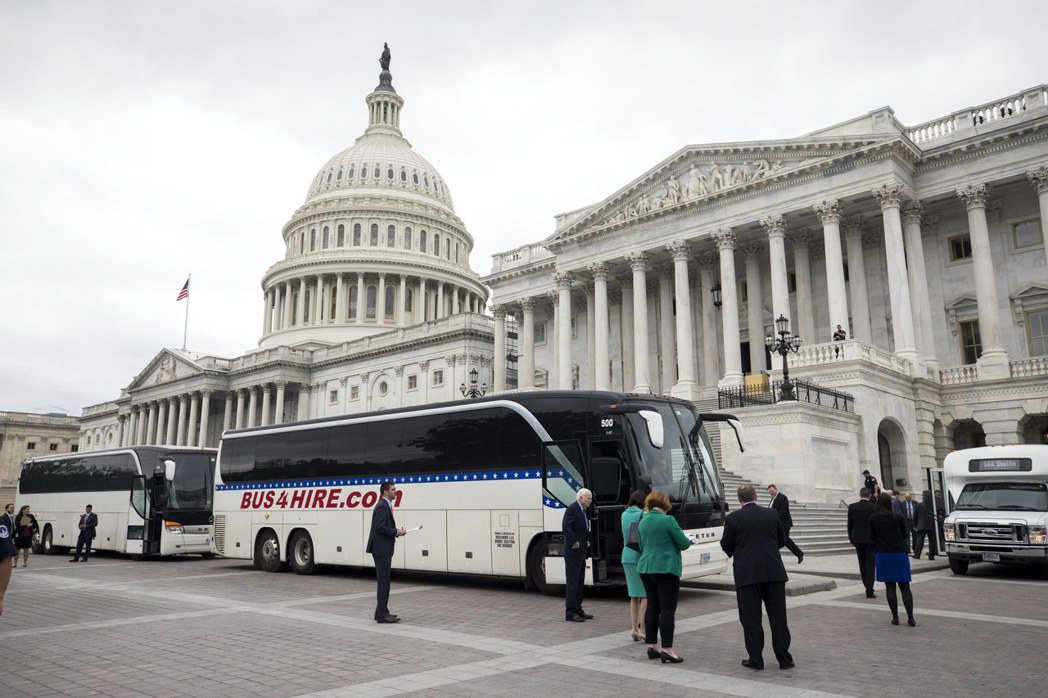聯合/看美國健保攻防,民進黨該慚愧

正當朝野為了「前瞻建設計畫預算」相持不下,連日在立法院推擠武鬥;美國參院有四名共和黨議員宣布不支持執政黨廢除「歐記健保」的修正案,使得川普處心積慮要推翻歐巴馬健保改革的計畫功虧一簣。執政黨議員應以人民的福祉為重,毋須當政府的應聲蟲,這不啻是美國參院給此間民進黨的示範,也是為台灣混戰式民主上了一課。
川普大選時即一再揚言要推翻歐巴馬的平價醫療法案,以共和黨在參、眾兩院的席次優勢,要廢除「歐記健保」本非難事;然而,川普卻一再在黨內踢到鐵板。四月初,川普先在眾議院吃到苦頭,不少共和黨議員拒絕為他背書;後來幾經協商,不斷修改法案內容,才勉強以四票之多表決通過。然而,當時仍有廿位共和黨議員「跑票」,不支持這個版本。
五月初眾院驚險通過廢除歐記健保時,被視為川普上任後的第一場重大勝利,川普更得意洋洋地宣稱:「這場災難終於死了!」但當時美國政界判斷,以參院生態,絕不可能照單全收眾院版本,必會另提修正版以爭取支持。參院多數黨領袖麥康諾果然提出新修正案,但即使如此,仍有四名共和黨參議員相繼宣布無法支持此一版本,使該案過關無望。
共和黨誓言廢除「歐記健保」已達七年之久,為何到頭來這項任務仍栽在自己人手裡?其中關鍵,倒不是歐記健保有多好,事實上,歐記健保雖照顧了許多低所得者,卻也留下嚴重的財務問題。然而,當好幾百萬人因此受惠,尤其共和黨主政的一些貧困州加入健保的人越來越多,若要推翻歐記健保,川普必須提出更好的替代方案才行,但顯然共和黨做不到這點。對川普而言,他只一心一意要除去眼中釘;但對共和黨議員而言,卻必須照顧選民的利益和自己的理念,而不是一味附和及臣服於總統的意志。
拿我國立法院審查前瞻預算的朝野混戰,與美國參、眾兩院處理歐記健保的景況作一對照,民主的形式和內涵高下立判。第一,從三權分立的原則,國會議員毋須當總統的應聲蟲或馬前卒,更毋須對行政部門的法案照單全收,而應務實制衡和立法。第二,從民主政治的觀點,政治角力不應以政黨認同為唯一界線,價值與理念的堅持有時須超乎政黨的利益盤算之上。第三,從代議政治的角度看,國會議員應當為民喉舌,將民眾福祉放在政黨的指令之前。第四,就法案的協商而言,其過程越是保持開放與理性,越有可能獲致更大共識並取得正當性;否則,打再多群架,亦無助改善法案的品質。
值得一提的是,美國《洛杉磯時報》日前發表了一篇「蔡英文聲望比川普還低」的評論,將蔡英文和川普相提並論,並配上一幀勞工團體在蔡英文肖像臉上砸滿豆腐的照片,狀極難堪。洛杉磯時報的評論指出,蔡英文的低民調,主要是她在兩岸關係上毫無作為,甚至把兩岸關係帶向「冷戰」。這樣的看法,是從國際的角度切入;但如果從內政的角度切入,國人更將看到蔡總統大權獨攬而行事專斷,包括她把朝野關係推向對立,引發族群和世代互相敵視,將行政院矮化為行政局,把民進黨立院黨團變成其馬前卒。從這些角度看,她比川普人氣還低,完全不意外。
我們之所以舉美國國會的健保攻防為例,就是要提醒民進黨:「完全執政」,並不表示可以「完全胡搞」、「完全專制」。在解嚴卅年的紀念會上,民進黨儼然以台灣的民主功臣自居,將所有功績攬在自己身上。然而,看看蔡政府草率的前瞻計畫,一意孤行的一例一休,不斷越法擴權的行政作為,綠委在國會卻只會一味護航,他們難道看不出台灣民主正在倒退?前人開創的兩岸和平和經濟成績正在遭敗壞?對此,民進黨應該慚愧!
Taiwan's president is now less popular than Trump. Here's why
Taiwanese President Tsai Ing-wen came to power 14 months ago on pledges to keep the peace with China without declaring formal independence or getting too close to Beijing.
It has been a difficult balancing act. Increasingly, Taiwanese voters are unimpressed with the results.
Tsai’s approval rating sank to 33% in June, down from just over 39% a month earlier. That puts her in politically dangerous territory, below even the historic low ratings that U.S. polls show for President Trump.
Tsai has kept the peace, as promised, but relations with China have been tense, and Beijing has taken steps to undermine its Taiwanese rival. China has claimed sovereignty over self-ruled Taiwan since the Chinese civil war of the 1940s, but Taiwan — with tacit U.S. support — has resisted unification.
Many Taiwanese see Tsai’s policy as one of inaction, not stability.
“The government has taken a very negative attitude on mainland China policy,” said Ku Chung-hwa, a standing board member with the Taipei-based watchdog group Citizen Congress Watch, which advocates transparency in government. Despite Beijing’s demands to come to the table as a unified China, he said, “Tsai has nothing to say. This stalemate is typical of a cold war.”
One of the biggest blows to Tsai’s government came last month when Panama severed formal ties with Taiwan’s government, formally known as the Republic of China, after more than 100 years of diplomatic recognition. That prompted critics to accuse Tsai of a failed foreign policy. The government said China lured Panama to switch allegiance to Beijing to punish Taiwan.
The Taiwanese Public Opinion Foundation said its surveys show that 58% of respondents are dissatisfied with the president’s handling of China. About 60% want eventual independence. (Although Taiwan is functionally independent from China now, it exists in legal limbo and is recognized by only a few countries.)
Those who prefer dialogue with China believe it could minimize the risk of conflict and extend trade and investment ties that Tsai’s predecessor had facilitated. Trade reached $121 billion in the year just before Tsai took office and tourist arrivals from China numbered a record 3.3 million in 2016.
Without stronger ties between Taipei and Beijing, Chinese officials will probably continue to use their global economic weight to urge other diplomatic allies to switch allegiance. One in Africa made the jump last year. Chinese naval vessels are also expected to sail near the island — which Beijing has done twice since December — and dial down tourism. Group tourist arrivals fell 18% last year.
“Certainly China will continue to use the hard-line approach to make Taiwanese people uncomfortable and see what happens later on,” said Andrew Yang, secretary-general of the Chinese Council of Advanced Policy Studies think tank in Taiwan.
Tsai was elected in January 2016 in a landslide over the ruling Nationalist Party candidate, in what was seen as a rejection of the Nationalists’ overtures to Beijing. But many of her supporters are having second thoughts now.
“We still have to confront the truth that Taiwan is economically reliant on China, and Tsai has to strategically manage the bilateral relationship,” said Taipei schoolteacher Bernie Huang, 28, a Tsai supporter in 2016.
“Apparently the bilateral relationship is not managed well, since our former ally Panama has broken up with Taiwan and established diplomatic ties with China,” he said. “For the Taiwanese government, it is a major defect in diplomacy.”
Former President Ma Ying-jeou was seen as caving in to Beijing’s demand that Taiwan consider itself as part of China, which has the world’s second biggest economy and third-strongest armed forces. Tsai rejects the one-China condition.
Dissatisfaction with her performance does not necessarily mean that her supporters are abandoning her.
“Supporters are still numerous but just might not be satisfied,” said Lee Ming-yu, 39, a city government employee in the southern city of Tainan. Tsai just needs more time, Lee said.
Tsai, a 60-year-old law scholar and former head of the government’s China policymaking body, has reduced the “stagnation” in Taiwan of a year ago, her office said in a written response to the opinion poll.
“Compared to a year ago, with the hard work of our government and our people, every type of important economic indicator is moving in a forward direction,” the statement said.
The president has played up economic policy such as infrastructure spending and time-off requirements for workers. The economy is expected to grow by about 2% this year, up half a percentage point from 2016, and manufacturing output is expected to exceed that.
Trade with China grew to $133 billion from April 2016 to April 2017, mostly under Tsai’s watch.
“I think she will continue to hold her position, no surprises, and maintain the status quo [on China], because that is her foundation,” Yang said. “Even though her approval rating is getting lower, she will hold in that position as long as possible.”


 留言列表
留言列表
